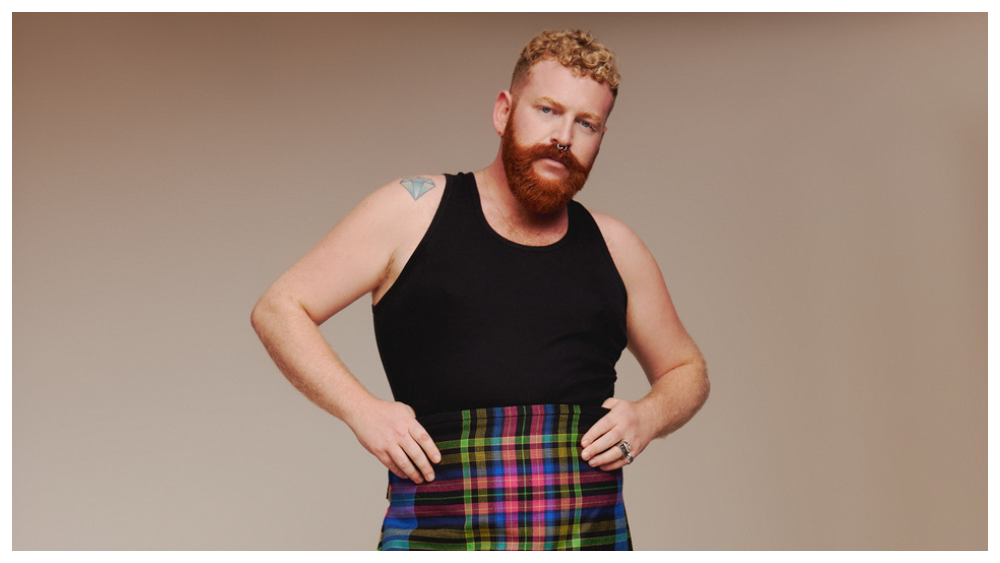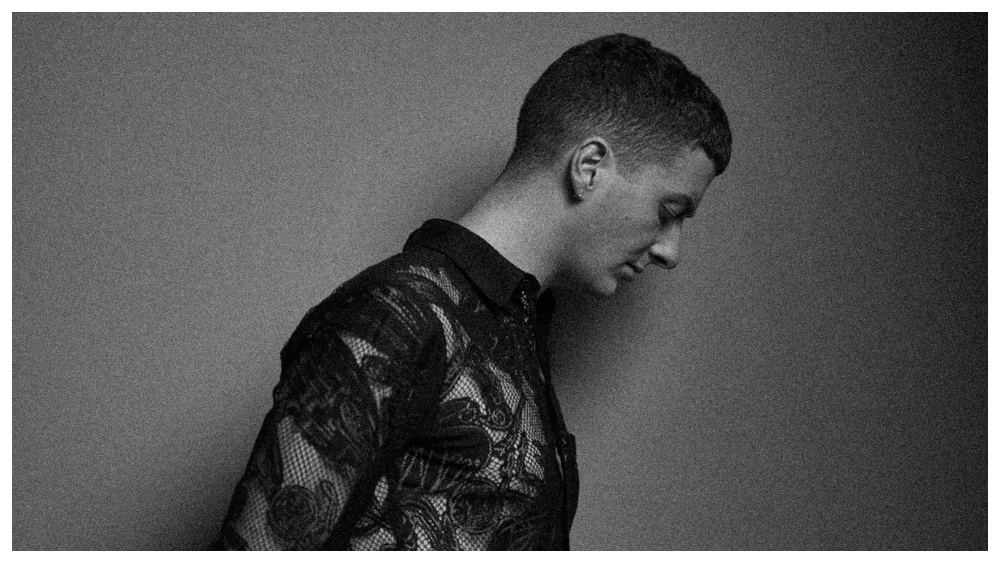Rina Sawayama is moving forward. In the two years since her debut album Sawayama was released into a world in lockdown, she has had time to reckon with her experiences, and with herself as an artist. Where Sawayama looked outwards, responding to the various ways Rina is perceived as a queer Japanese-British woman in the public eye, her second album Hold the Girl looks at the effects of these perceptions and other traumas from the inside.
Initially intending to write a ‘happy record’, Rina found herself returning to difficult subject matter from a changed perspective. Things feel different in your thirties than they did in your twenties, and new experiences can lend a fresh perspective on things that once seemed resolved. ‘I’m done with trauma records now I think,’ Rina laughs. ‘Hopefully. My god, I hope there’s nothing else. I joke, but it’s a lifelong journey, isn’t it?’
That ebb and flow, the push-pull of the past as we cycle between being haunted by and released from it, is placed front and centre early on in Hold the Girl. Sharing its title with Cathy Park Hong’s collection of essays on the Asian American experience, album opener Minor Feelings is a stirring song about the eventual overflow of long-suppressed emotions and trauma.
‘She was writing about her experience as an Asian woman and the history of Asian Americans in general, and how so many things have been overlooked. That process – overlooking certain historical events or day-to-day experiences – she calls "minor feelings". We minimise our feelings so that it doesn’t matter as much, when actually those things can absolutely pile up and make us feel a certain way,’ Rina says.
‘I was quite adamant that I didn’t want to repeat what I’d done for the first record in any way.'
Sonically, the opening track also sets the tone for a second album eager to differentiate itself from the first.
‘I was quite adamant that I didn’t want to repeat what I’d done for the first record in any way,’ says Rina. ‘Because that was several years ago and I’ve moved on. My desires and my interests have changed as well. I think it’s natural for that to happen. I wanted to be authentic to how I was feeling.’
Rina was, she says, in a 'sombre mood'. Hold the Girl reflects on trauma from a place of healing and insight gained through therapy. But while the album goes down into the darkness, it doesn’t stay there. Minor Feelings addresses and protects a vulnerable inner child, while Catch Me in the Air celebrates the growth of Rina’s relationship with her mother and the struggles of single parenthood. Built around a Corrs-inspired pop rock framework, Catch Me in the Air rises and falls with Rina’s soaring vocals. At festivals throughout the summer, its power was palpable as crowds were carried along with a song that was yet to be released.
‘I’ve found it’s best for me when I’m able to joke about the hard things that have happened in my life, and also find the people who are willing to joke about it with me.’
Then there’s This Hell. A Shania-esque country-pop bop, Hold the Girl’s lead single rolls its eyes at homophobes who threaten queer people with eternal damnation. Like Rina’s 2019 single STFU!, which pushed back against the microaggressions experienced by Asian people, This Hell takes a prejudice and inverts it.
‘You get to a certain point in getting emotional about something that’s happened in your life, where you’ve got to be able to have that safe space to make fun of it and make light of it. Because it’s really hard to just keep everything dark forever. I’ve found it’s best for me when I’m able to joke about the hard things that have happened in my life, and also find the people who are willing to joke about it with me,’ Rina says. ‘I think a lot of people in the community can relate to that – having a great community of friends who give you that safe space to take the piss out of something painful that happened to you.’
While This Hell’s central sentiment – that awful experiences, up to and including an eternity in the haunted soul soup of the underworld, are made bearable by people you love – no doubt resonates widely after the last several years, the song is fundamentally queer. Partly because it celebrates chosen family, and partly thanks to its country edge. Cowboys of all genders are very gay right now.
‘I was at a festival the other day, and one of the other acts was in full cowboy gear, and I was like, “What is going on?” It’s not like we’re talking to each other about it. No one’s saying, “Hey MUNA, let’s both make a country record,”’ Rina laughs. ‘We’re doing it completely independently. I think you’ve got to thank Lil Nas X and Kacey Musgraves for that kind of thing. And Shania with her documentary, and joining Harry Styles on stage. There’s a lot of micro-yeehaws happening.’
This Hell is a micro-yeehaw in itself. The accompanying music video follows a wedding in which Rina, dressed in white cowboy boots and an enormous hat and veil, marries two people in similar attire, and then moves on to an exclusive underworld club. As the track’s electric, twanging riff rings out, the wedding party falls into line-dance formation. The riff is key, but for a minute there it nearly didn’t see the light of day.
After realising that the central riff bore a coincidental resemblance to ABBA’s Gimme! Gimme! Gimme! (A Man After Midnight), Rina re-wrote parts of the melody. In the meantime, though, she also reached out to Elton John. Elton put her in touch with Benny Anderson, who ultimately gave the original version of the track his blessing with an understated, ‘No problem. Absolutely fine.’
‘I was like, "Who knows Benny or Bjorn? Who knows everyone in the industry?" He’s an angel, helping me out,’ says Rina. ‘I could be in a 127 Hours situation, and I would call Elton. Before I called an ambulance, I would call Elton.’
‘Someone pointed out to me that, as a woman, country music or country pop are some of the few genres where you don’t have to sexualise yourself.'
For all its fun imagery and pop culture connections, This Hell’s country element also speaks to a sense of vulnerability running through the centre of the album. Citing Kacey Musgraves’ Golden Hour and Lil Nas X as influences, Rina acknowledges that the emotional openness of country-pop as a genre was one of many driving factors behind the album’s sonic world. When her plans to write the album in Nashville were blocked by lockdown, Rina brought Nashville to her. But there’s another layer here, too.
‘Someone pointed out to me that, as a woman, country music or country pop are some of the few genres where you don’t have to sexualise yourself. It makes sense why, in the context of this album, I felt like it was a safe space for some of my ideas.’
It’s easy to see why Rina felt Hold the Girl’s ideas needed to protecting. Its themes – girlhood, queerness, the parent-child relationship – are delicate. In one of the album’s most affecting tracks, Rina writes from the perspective of an immigrant mother opening up to her child’s queerness. Send My Love to John acts as a redemption and an apology.
‘My friend’s parents are, I would say, pretty homophobic, and have never been supportive of my friend’s queerness. For the longest time, even though they have a relationship, that side of my friend has never been discussed positively,’ Rina says. ‘So, one day there was a new boyfriend on the scene, and they’d been having the best time so sent pictures to their mum even though she’d not been fully supportive. After a couple of months, out of nowhere, their mum was like, “Hey cool, speak to you tomorrow – and send my love to John.” That was the first time that she’d really acknowledged their queerness and said it in a positive way. I thought that was really special but also sad, because maybe that’s the only morsel of a sorry that my friend is ever going to get.’
‘Under every video I probably get a few comments saying, “Oh my god, she’s such an industry plant.” I'm like, “Sis? I would be an industry tree at this point.”'
Send My Love to John speaks to the emotional depth and connection to community that has acted as a driver on Hold the Girl. Much of Rina’s creative team is queer, which shapes the way her live shows are constructed and allows her to bring her music to life in a way that feels authentic. It’s almost ironic, then, that she recently went viral with a comment about being called a plant.
‘Under every video I probably get a few comments saying, “Oh my god, she’s such an industry plant,”’ says Rina. 'I'm like, “Sis? I would be an industry tree at this point.” They're not doing very well if they’re trying to plant me for this long.’
It's easy to joke about, but there are more serious undertones.
‘Is it a sexist thing? Is it often said against women? I don’t know. I feel like maybe it is,’ Rina says. ‘I think a lot of people, without meaning to sound sexist, kind of are sexist. In their mind, they’ll put down the success of a female artist to some male product manager at a label, saying, “Well they’ve done all the work, she’s just been sitting there waiting to sprout.’
It seems an especially absurd suggestion now, on the cusp of Hold the Girl’s release. Rina’s first EP came out in 2017, with Sawayama following in 2020. Both releases were praised for their magpie-like approach to influences and genre, as Rina toyed with the boundaries of what a pop artist could be. Hold the Girl continues this progression, matching the most personal subjects with the genre elements most suited to housing them, and mixing them with scraps of other art forms. In some ways, this album's seeds were sown decades ago, and it's now being nurtured into something larger as Rina pulls it into the light.
The devil works hard, but Rina Sawayama works harder.





